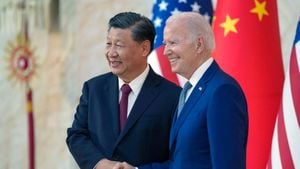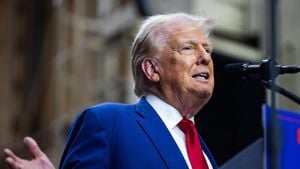After the dust settled from the 2024 elections, the Republican Party basked in the glow of significant victories as they secured control of both chambers of Congress and the White House, culminating in what many are calling a "Republican trifecta." This development reshapes the political tableau as President-elect Donald Trump gears up for another term starting January, positioning him and the GOP to drive forward their legislative ambitions.
Trump's resounding win at the polls not only reinstated him as the head of the GOP but also solidified Republican influence across the board. The Associated Press confirmed these victories, emphasizing how Republicans managed to maintain control of the House of Representatives—albeit by a narrow margin—while regaining the Senate alongside the presidency.
The ramifications of this trifecta are promising for Trump and his allies, as it grants them the leverage they need to push through their full legislative agenda. With key legislative projects on the table, Trump’s administration can focus on tax reforms, funding for border security, and potential revisions to the Affordable Care Act. House Speaker Mike Johnson, who has been closely aligned with Trump, hinted at ambitious reforms for the early days of the new administration.
For the Republicans, victories were particularly notable in battleground districts where they successfully flipped seats. Notable wins took place in states like Pennsylvania and Colorado. These electoral gains happened against the backdrop of heightened issues—such as women's reproductive rights—that seemed to resonate with voters, yet the GOP managed to counteract the Democrats' narrative effectively.
Despite the celebratory atmosphere, party unity remains a pressing concern for Republican leaders. The very members who secured the House majority often hold divergent views, which could lead to legislative challenges down the line. Discussions of internal strife among ultraconservative and moderate factions hint at potential clashes, especially on subjects like federal spending and immigration reform. Johnson’s leadership will be tested as he attempts to navigate these complex dynamics, attempting to forge consensus without alienation.
Meanwhile, the Democrats find themselves licking their wounds after the 2024 elections. With President Biden and Vice President Harris poised to leave office, the party faces the dual challenge of regrouping and countering the Republican agenda. The electoral defeat leaves significant questions about leadership within the Democratic ranks. Many influential Democrats, including strategists and lawmakers, stress the necessity of identifying new leaders to challenge the GOP’s dominance.
Democrats are already peering toward their up-and-coming stars. Figures like governors Josh Shapiro of Pennsylvania and Gavin Newsom of California, along with various younger lawmakers, have emerged as potential beacons for the party moving forward. These leaders are tasked with finding ways to collaborate with Republicans, especially around issues like government funding, which are increasingly contentious but critically necessary to address.
Competition for the future direction of the Democratic Party also revolves around vocal progressive leaders such as Alexandria Ocasio-Cortez. With contrasting views surfacing within the party, many anticipate the emergence of new dialogues and strategies as the Democrats aim to reclaim lost ground. They must unite to challenge the GOP’s policies, which include aggressive tax cuts and potential changes to healthcare regulations.
Reflecting on the tumultuous nature of politics, some Democratic strategists express concern about how the loss will affect party progressiveness moving forward. Jim Manley, known for his work with former Senate Majority Leader Harry Reid, emphasized the urgent need for introspection: “We’ve got to figure out what went wrong.” This civil discourse surrounding introspection is visible among many party members who feel the urgency to overhaul their approach to address voter disillusionment.
The divisions between moderates and the more progressive members are pronounced. Meanwhile, Republicans may find themselves caught between loyalty to Trump and their individual districts. Incoming representatives who survived tight races will pose challenges to Trump’s agenda, especially on fundamental issues like infrastructure spending, which could create friction, as some GOP lawmakers start to voice their dissent.
Across the aisle, Democrats like Ro Khanna are considering which Republican lawmakers might be amenable to cross-party collaborations on specific issues, highlighting potential allies who prioritize compromise over confrontation. The dynamics for cooperation will likely shift as the reality of governance looms, and as grassroots movements persist, progressive and moderate voices must unify within their camps for viability.
Looking forward, the Republican trifecta has offered Trump and his party vast possibilities, but with these possibilities come deep-seated tensions—both within the GOP and against the backdrop of the opposition. Some lawmakers are preparing for increased scrutiny from their constituents as they balance Trump’s aggressive agenda against the expressed needs of their voters. Whether this leads to gridlock or collaboration will shape the political horizon for the next couple of years and beyond.



